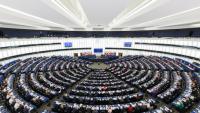-
ISIS uses Whatsapp, Telegram to sell girls and women as sex slaves

ISIS has been using instant messenger apps Whatsapp and Telegram to advertise Yazidi women and girls as young as 12 for sale as sex slaves. These apps are also being used to share photos databases of women held by ISIS as sex slaves. ISIS uses the apps to distribute these of photographs to ISIS militants manning the group’s checkpoints so that these women can be identified if they try to escape ISIS-controlled territory. Telegram and Facebook-owned Whatsapp both use end-to-end encryption, preventing the two companies from accessing users’ communications.
-
-
Five officers killed by a sniper in Dallas (updated)
Five police officers were killed, and seven officers and two civilians injured, on Thursday by 25-year old Micha Xavier Johnson, who opened fire on the officers during a protest march in Dallas. During a 3-hour standoff with the police, Johnson said he was not associated with any group or organization, and that his only purpose was to kill White people – especially White police officers. It was the deadliest attack on law enforcement officers since the 9/11 terrorist attacks.
-
-
U.S. decision to dismantle Saddam’s army led to ISIS emergence: U.K. foreign secretary
Philip Hammond, the British foreign secretary, said that the single most disastrous mistake relating to the U.S. 2003 invasion of Iraq was the mass removal of supporters of the Ba’ath party from the Iraqi army. Hammond said this decision led directly to the creation of ISIS.
-
-
DHS announces the Countering Violent Extremism grant program
Secretary of Homeland Security Jeh Johnson on Wednesday announced the Fiscal Year (FY) 2016 Countering Violent Extremism (CVE) Grant Program, with $10 million in available funds. DHS snotes that this is the first federal assistance program devoted exclusively to providing local communities with the resources to counter violent extremism in the homeland.
-
-
DHS announces the Countering Violent Extremism grant program
Secretary of Homeland Security Jeh Johnson on Wednesday announced the Fiscal Year (FY) 2016 Countering Violent Extremism (CVE) Grant Program, with $10 million in available funds. DHS snotes that this is the first federal assistance program devoted exclusively to providing local communities with the resources to counter violent extremism in the homeland.
-
-
Schengen agreement allows free movement of terrorists: French security panel
A French parliamentary committee said on Tuesday that potential terrorists can move too freely in the Schengen open-border area, and that EU member-states should more systematically flag up suspects on a shared police database. The committee also called for reforming France’s six intelligence services and recommended merging them into a single counterterrorism agency. The committee’s 300-page report focused on the debilitating effects of poor coordination among French police and intelligence services, and among the twenty-six European countries which are members of the Schengen agreement.
-
-
Planning terrorist attacks must be made a crime in all EU members states: MEPs

Travelling abroad for terrorist purposes, training or being trained, incitement to terrorism, or financing of terrorist activities must be made a crime in all EU member states, urge Civil Liberties Committee MEPs in a resolution voted on Monday night.
-
-
Irish Republican Ivor Bell to stand trial for 1972 murder of Jean McConville
A judge ruled that veteran Irish republican Ivor Bell, 79, will stand trial for involvement in the 1972 murder of Jean McConville, a mother of ten children. Bell is charged with aiding and abetting the kidnapping, killing, and secret burial of the widow. The case against Bell could be brought as a result of the content of tapes police secured from an oral history archive collated by Boston College in the United States.
-
-
Death toll of Baghdad attack climbs to 250
The Iraqi government said that the number of dead in Sunday’s massive suicide truck bombing near a central Baghdad shopping mall has reached 250, making it the deadliest attack in Iraq since the 2003 U.S.-led invasion. The Iraqi health ministry said the number of dead is likely to rise as more bodies are being pulled from the rubble, and more of those seriously injured die in hospitals.
-
-
Iraq to stop using fake bomb detectors in wake of Baghdad attack
In the wake of the deadliest terrorist attack in Iraq since 2003, Iraq’s prime minister Haider al-Abadi has instructed all the country’s security forces – the federal and local police and the army — to stop using fake bomb detectors at the hundreds of security checkpoints across the country. A British businessman, James McCormick, purchased thousands of the novelty golf ball finders for $19.95 each, repackaged them, and then sold them to Iraq and other nations as advanced hand-held bomb detectors. McCormick charged $40,000 for each of the repackaged golf-ball finders.
-
-
Women’s connections, role in extremist networks
Researchers who examined the role of women in extreme networks or organizations, such as terrorist groups, dispelled the common assumption that women are lured into these dangerous environments solely to offer support while men are recruited and tend to be the key players. Instead, the researchers found, women are better connected within the network, essentially becoming the glue holding the system together, fueling its vitality and survival.
-
-
Baghdad terrorist attack’s death toll reaches 175

Iraqi officials say that the death toll from Saturday’s massive ISIS suicide bombing near two busy shopping malls in Baghdad now stands at 175. The number is going to rise, as more bodies are being recovered from the destroyed and burned-down buildings. Prime Minister Haider al-Abadi ordered the bolstering of security measures in Baghdad and other cities. These measures include the withdrawal of a fake hand-held bomb-detection device which has been used at Iraqi security checkpoints.
-
-
Suicide bombers attack mosque in Medina, other Saudi targets
In an escalation of violence in Saudi Arabia, suicide bombers on Monday killed four Saudi security forces in an attack outside the Prophet’s Mosque in Medina, one of the two holiest sites in Islam. The bombing outside the Medina mosque was one of a series of attacks in Saudi Arabia on Monday. The bombings reflected ISIS strategy of targeting of Shia Muslims and U.S. interests, as well as attacking targets important to Sunni regimes which ISIS regard as corrupt.. Experts note, though, that the attack on or near one of the holiest sites in Islam is a significant escalation in ISIS campaign.
-
-
The Entebbe rescue, 40 years later

On 4 July 1976 — 40 years ago Monday — Israeli commandos carried out a daring raid to rescue over 100 Jewish and Israeli hostages held by Palestinian and German terrorists at the Entebbe airport in Uganda. A week earlier, two terrorists from the Popular Front for the Liberation of Palestine (PFLP) and two German terrorists from the Baader-Meinhoff gang had hijacked Air France flight 139 as it took off from Athens bound for Paris, the final leg of its journey that had begun in Tel Aviv. When the plane landed in Uganda, the Jewish and Israeli passengers were separated from the others.
-
-
A legend is born
On 6 July1976, two days after the daring Israeli commando raid which rescued more than 100 hostages who were being held by Palestinian and German terrorists at the Entebbe international airport in Uganda, the New York Times published an editorial, titled “A legend is Born.” “By this unprecedented action, the Israelis have demonstrated that the criminal terrorist practice of holding the lives of innocent civilians for ransom to achieve political ends can be successfully thwarted by application of sufficient amounts of resourcefulness, determination—and guts,” the Times wrote.
-
More headlines
The long view
How Male Grievance Fuels Radicalization and Extremist Violence
Social extremism is evolving in reach and form. While traditional racial supremacy ideologies remain, contemporary movements are now often fueled by something more personal and emotionally resonant: male grievance.
